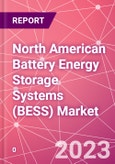Reshaping the North American Energy Markets through Battery Energy Storage Systems
This research report includes market size, growth rates, end-user split, competitive market share data, and revenue forecasts from 2022-2029 for the United States and Canada.
The study is a comprehensive analysis including market share splits by battery chemistry (NMC, LFP, lead acid, flow batteries, and others), power range (below 17kW. 17kW-85kW, 85kW-175kW, 175kW-350kW, 350kW-1200kW, and above 1200kW), application (prime power, peak shaving, and standby power), end user group (utility, residential, commercial & industrial, data centers, material handling, and others), connection type (front-of-meter, behind-the-meter, and off-grid) and rental provider. Furthermore, profiles of key companies, growth drivers, restraints, challenges, and quotations from industry participants are also included in this analysis of the temporary power opportunity.
The demand for BESS has rapidly increased during the last two years, driven by grid stability issues, declining solar and battery systems costs, NEM 2.0, and fiscal subsidies. This study aims to provide a detailed analysis of the North American Battery Energy Storage Systems Market along with competitive intelligence for the year 2022.
The market numbers included in this report represent revenues generated by companies operating in the North American Power Rental Market by country (United States and Canada) The base year for the study is 2022 and the forecast period is from 2022 until 2029.
This study captures the following information on North American Power Rental Market:
- Market Size, Growth Rate, Revenue Forecasts (2022-2029)
- Growth Drivers & Restraints
- Market Data
- Quotes by Key Industry Participants
- Market Share Analysis
- Market Trends
Major Companies Featured: Enphase Energy, LG Energy Solutions, Tesla, Inc., Fluence Energy, CATL, BYD Lithium Battery, Stem, Inc., Samsung, Panasonic, and Generac among others.
Table of Contents
I. Research Scope, MethodologyII. Segmentation by End User, and Battery Chemistry
Executive Summary
This recent assessment indicates substantial growth within the North American Battery Energy Storage Systems (BESS) Market. This expansion is particularly pronounced due to recent technological advancements and shifts in regulations. Notably, the years 2021 and 2022 witnessed remarkable progress, with market dynamics influenced by factors such as grid stability, the integration of renewable energy, and the proliferation of electric vehicles. By the close of 2022, the North American battery energy storage systems industry had achieved a remarkable revenue of nearly $5.0 billion, an astonishing feat considering its nascent state just five years ago.
The BESS market's trajectory is significantly impacted by supply chain dynamics. Lengthy lead times for new battery systems and components have driven demand for advanced storage solutions, especially among customers grappling with equipment delays. Enterprises possessing streamlined supply chains have capitalized on this scenario, fostering market growth. Conversely, these supply chain complications have disrupted manufacturing plans and expansion strategies for several players in the BESS sector. Furthermore, a shortage of skilled labor in the BESS domain presents a notable challenge. This scarcity affects multiple facets, ranging from system design and installation to maintenance and issue resolution. The dearth of experienced technicians could impede growth opportunities for certain companies operating within the market.
Despite these obstacles, the BESS market is flourishing due to the advantages of advanced storage solutions, urbanization, and the increasing integration of renewable energy sources. The North American BESS Market report categorizes the market based on end users, battery chemistries, applications, and capacities. Key sectors encompass residential, commercial, utilities, and transportation. Among various battery chemistries, lithium-ion batteries predominate due to their high energy density and declining costs. Safety concerns and elevated expenses associated with Nickel Manganese Cobalt (NMC) batteries, featured in products like Tesla’s Powerwall and LG Energy Solution’s RESU Flex residential battery storage system, are shifting the market's focus toward Lithium Iron Phosphate (LFP) batteries. Nevertheless, emerging technologies like sodium-ion batteries are also gaining ground, presenting cost-effective and sustainable alternatives.
The utility sector remains a prominent player in the BESS market, driven by the escalating demand for grid stability and the integration of renewable energy. Evolving energy consumption patterns and regulatory frameworks continue to shape this sector's dynamics, influencing the call for advanced battery storage solutions. Similarly, the residential sector is experiencing a surge in BESS demand, propelled by the growing adoption of solar energy solutions and the necessity for backup power sources. With urbanization and technological progress ongoing, the BESS market is poised to observe heightened demand across diverse sectors.
The North American Battery Energy Storage Systems (BESS) Market report profiles key companies such as Tesla, Inc., Enphase Energy, LG Energy Solution, Fluence Energy, Panasonic Corporation, Samsung SDI, CATL, Stem Inc., Generac Corporation, and BYD Lithium Battery. This report offers a comprehensive analysis of the North American BESS Market, encompassing drivers of growth, constraints, market revenues, forecasts, technological trends, and a competitive landscape evaluation. Market share data is presented based on battery chemistry, power range, application (prime, peak shaving, and standby power), connection type (front-of-the-meter, behind-the-meter, off-grid/rental), and company revenue.
Companies Mentioned (Partial List)
A selection of companies mentioned in this report includes, but is not limited to:
- BYD Lithium Battery
- CATL
- Enphase Energy
- Fluence Energy
- Generac
- LG Energy Solutions
- Panasonic
- Stem, Inc.
- Samsung
- Tesla, Inc.








